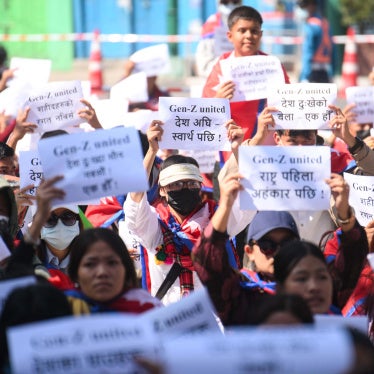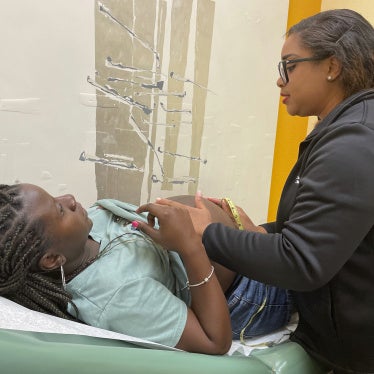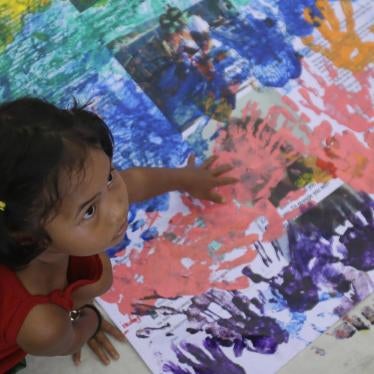Theodor Wanner Award
Kenneth Roth
June 21, 2016
It is with great pride that I accept the Theodor Wanner Award on behalf of Human Rights Watch. We are deeply grateful to the IFA for recognizing our work and endorsing our cause.
We are also happy to suggest that the 10K Euro prize be given to the Global Coalition to Protect Education from Attack. Human Rights Watch helped to found the coalition and works closely with it. Our goals are to stop illegal attacks on students, teachers, and schools, and discourage armies and armed groups from endangering children and their education by using schools as military bases. In a little over a year, 54 governments have already signed onto the Safe Schools Declaration, committing themselves to promote these aims. Sadly, Germany is not yet among them. We hope that changes soon.
Human Rights Watch is an independent global organization committed to defending peoples’ most basic rights. Governments often are tempted to violate human rights to preserve their grasp on power or as a quick-and-dirty way to get things done. Human Rights Watch deploys the power of information to generate pressure on governments to resist that temptation and to respect everyone’s rights.
Human Rights Watch is testament to the power of civil society. We are not a government. We have no army or police. Yet our voice is powerful because we have the capacity to investigate violations of human rights, expose their authors to public shaming, and generate pressure for change.
Human Rights Watch demonstrates the influence that people can have when they pool their energies, talents and resources to advance common values. Alone, none of us could accomplish much. Together, we have the capacity to move governments, even in distant parts of the world.
It is thus appropriate that we receive this award tonight before the global leadership of Human Rights Watch—the members of our Board of Directors, the leaders of our 26 support committees and circles of friends around the world, and a strong component of our professional staff. Those of you here tonight ARE Human Rights Watch. It is because you have chosen to contribute to our cause in so many ways that we are able to hear the voices of those facing neglect and repression, answer their call for help, and force governments and others to respond.
Beyond the honor I feel appearing before you tonight, I also stand here out of a sense of urgency. Our ability to shame governments—to highlight their violations of human rights and to hold them up to public opprobrium—depends on broad segments of the public sharing our values. If people applaud human rights abuse, if they approve of violations of human rights, our ability to shame abusers, and get them to change their ways, is limited. It is thus of deep concern that a growing number of governments and politicians are taking aim at the foundational values of our movement.
Here in Europe, leaders such as Hungary’s Victor Orban and Poland’s Jarosław Kaczyński speak openly of building an “illiberal democracy”—one that doesn’t need human rights or the checks and balances that protect them. In country after country, we see the rise of far-right parties that trade in intolerance, xenophobia, nativism, and fear. Even mainstream parties sometimes mimic this anti-rights program out of the naïve and futile belief that they might be seen as more effective populists than the populists.
This is not exclusively a European phenomenon. We see it as well in American demagogues who advance their political prospects by appealing to our worst instincts of fear and prejudice. We see it in China’s and Russia’s promotion of authoritarian rule as a superior governance model. We see it in African leaders’ attacks on international justice because prosecutors have targeted their mass atrocities. We see it in the growing number of governments trying to keep citizens from banding together to make themselves heard. And we see it in the Syrian government’s decision to rip up the Geneva Conventions and fight a war by deliberately attacking civilians in opposition-held areas.
But because we are in the heart of Europe, I’d like to focus on what is happening here. We have all witnessed the rising Islamophobia, the tarring and marginalizing of entire communities, the demonizing of refugees, the efforts to turn back the clocks to a time when society was seen as more uniform.
The causes of this rising intolerance are easy enough to discern. These are times of economic insecurity, when many feel they are falling behind. These are times of physical insecurity, when people enjoying a night with friends in a Paris concert hall (not to mention an Orlando night club) are randomly shot down. And these are times of cultural insecurity, when the meaning of what it is to be German or French is no longer as simple as had long been assumed.
In such times of insecurity, there is a tendency to retrench, to seek shelter among those who seem most like you, to close the door to others. That instinct provides the platform for the growing voices of hate.
These are dangerous developments. They put in question the very nature of our democratic societies. They challenge the duty we all have to cherish the human dignity in each one of us. We must urgently reject this movement of hatred, exclusion and intolerance.
We can begin by cutting through the myths and misrepresentations that often accompany the case for intolerance. Consider the public discourse these days about immigrant communities in Europe. To be honest, most European governments in recent decades have a mixed record of integrating immigrants and their descendants, particularly Muslims. Many members of these communities face limited job and educational opportunities, discriminatory encounters with the police, a sense of not really being accepted by mainstream society. Most do the best they can under the circumstances, but some small minority is radicalized and turns to violence.
This is a serious problem, but Islamophobia is no solution. These communities are now an integral part of Europe. If we do not enable their residents to build meaningful lives, if we continue to frustrate their aspirations, their alienation and despair will only grow.
Or take the problem of terrorism. It’s true that today’s terrorist threat in Europe comes mainly from second and third generation Muslim immigrants. A smart counterterrorism strategy reaches out to the people who are most likely to learn of a terrorist plot before it unfolds—the plotters’ family, neighbors and associates, many of them also Muslim. We want all people to feel comfortable reporting suspicious activity to the police. We want everyone to feel part of the solution rather than the problem. But Islamophobia does the opposite. People who feel they cannot trust the police, that they themselves will be regarded with suspicion if they share their concerns, will remain silent.
Or let’s look at the refugees. We all comprehend the desperate need of people fleeing Assad’s barrel bombs and the Islamic State’s atrocities. They are people in urgent need of our help and sympathy.
Germany under Chancellor Merkel has been remarkable in welcoming these and other refugees, in giving them a haven from the war and persecution they flee. But that humanitarian embrace has prompted a reaction, as growing numbers of people want to close the gates. That has led, among other things, to the plan to forcibly return refugees to Turkey on the fiction that it is “safe.”
The million migrants who crossed the Mediterranean by boat in 2015 are a lot of people, but it’s important to point out that they represent only two tenths of one percent of the European Union’s population. In fact, the refugee problem that Europe faces today is one not of capacity but of politics. None of us wants to see chaos at Europe’s borders, but there are ways to manage the flight of refugees while respecting their right to seek a safe haven. I will highlight three.
First, it bears stating the obvious: we must increase pressure to stop the mass atrocities that are driving people to flee. That means, foremost, stopping the Assad government from deliberately targeting and besieging civilians. That strategy is epitomized by the town of Darayya, just 10 km south of Damascus. For four long years, the Assad government prevented food aid from entering Darayya, contributing to horrible deprivation. On the day earlier this month when the government finally allowed the first UN convoy of food aid to arrive, it then, in an act of cruel cynicism, dropped dozens of barrel bombs on the city’s population.
Assad could not continue to commit these atrocities without the military support of Russia. Assad may be beyond shaming, but Putin, who desperately wants the Ukraine sanctions lifted, is not. Putin cares very much for his reputation in Europe, especially in Germany. So every time Assad barrel bombs a school or hospital, every time he blocks a humanitarian convoy, every time he sends more people to torture and execution in his prisons, we should ask Putin why he lets these atrocities continue. The solution to the cruelty emanating from Damascus lies in Moscow.
Second, European governments should live up to their pledge to provide generous funding to enable refugees to build lives in the countries neighboring Syria—in Turkey, Lebanon, and Jordan. Most refugees prefer to stay closer to home in the hope that one day they can return, but they will do so only if they can send their kids to school, locate housing, secure jobs, and find medical care. When those necessities are paid for and available, many refugees will voluntarily stay in the countries that first received them.
Inevitably, though, some refugees will still want to seek a safe haven in Europe. So, third, European countries should work closely with the UN Refugee Agency to process refugees of all nationalities in Turkey, Lebanon and Jordan for resettlement in far greater numbers than has been achieved so far. People who pose a security threat or are economic migrants can be excluded, but those found to be fleeing persecution should be granted a haven without having to risk their families’ lives on a rickety boat across the Mediterranean.
We hope that many other countries, including the United States, Canada, and Australia, will join Germany in welcoming refugees through such orderly resettlement. That will lesson pressure on Europe’s borders—and help to end the chaos that is fueling the far right—without violating the rights of people in such desperate need.
Let me conclude by returning to the intensifying assaults on the values of human rights. Responding to those assaults is at the heart of our Human Rights Watch work. But it is also something that every one of you can help with.
Remember, populists love to say that they speak for the community, that they are the authentic voice of the people, that they are upholding national values from foreign intrusion. Your voice can provide an important retort. You can say, “No, those demagogues do not speak for me.”
Remember, every political movement starts locally. Every community begins with a circle of friends. So when you are chatting with friends or family, when you are discussing issues at the office, when you are engaging on-line, find space to include commentary on the latest attack on your values. Figure out ways to advance the conversation. Even if you start with just a few people, there is a ripple effect. If all of us gathered here do our part, the ripples can become waves, even tides.
The Theodor Warner Award was founded upon the values that we celebrate tonight. Human Rights Watch has spent 38 years upholding those values. In this dangerous moment, we cannot afford to be complacent. If we want a world built around those values, we cannot take them for granted. There is an urgent need now for all of us to come to their defense. We must all do our part.








